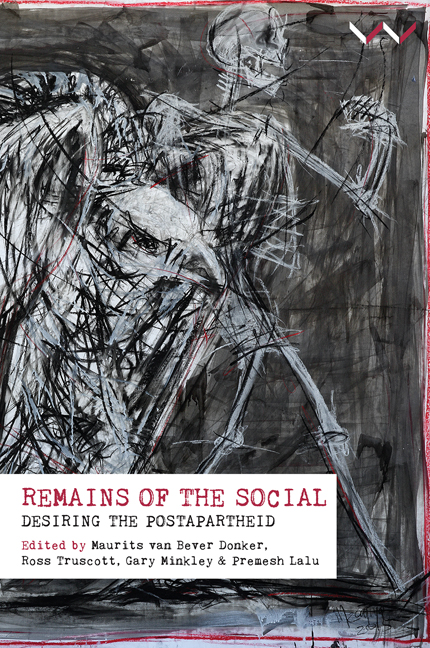Book contents
- Frontmatter
- Contents
- Acknowledgements
- Preface
- Chapter 1 Traversing the Social
- Chapter 2 The Mandela Imaginary: Reflections on Post-Reconciliation Libidinal Economy
- Chapter 3 The Return of Empathy: Postapartheid Fellow Feeling
- Chapter 4 The Ethics of Precarity: Judith Butler's Reluctant Universalism
- Chapter 5 Hannah Arendt's Work of Mourning: The Politics of Loss, ‘the Rise of the Social’ and the Ends of Apartheid
- Chapter 6 Souvenir
- Chapter 7 Re-Cover: Afrikaans Rock, Apartheid's Children and the Work of the Cover
- Chapter 8 The Graves of Dimbaza: Temporal Remains
- Chapter 9 The Principle of Insufficiency: Ethics and Community at the Edge of the Social
- Chapter 10 The Trojan Horse and the ‘Becoming Technical of the Human’
- About the Contributors
- List of Figures
- Index
Chapter 8 - The Graves of Dimbaza: Temporal Remains
Published online by Cambridge University Press: 21 April 2018
- Frontmatter
- Contents
- Acknowledgements
- Preface
- Chapter 1 Traversing the Social
- Chapter 2 The Mandela Imaginary: Reflections on Post-Reconciliation Libidinal Economy
- Chapter 3 The Return of Empathy: Postapartheid Fellow Feeling
- Chapter 4 The Ethics of Precarity: Judith Butler's Reluctant Universalism
- Chapter 5 Hannah Arendt's Work of Mourning: The Politics of Loss, ‘the Rise of the Social’ and the Ends of Apartheid
- Chapter 6 Souvenir
- Chapter 7 Re-Cover: Afrikaans Rock, Apartheid's Children and the Work of the Cover
- Chapter 8 The Graves of Dimbaza: Temporal Remains
- Chapter 9 The Principle of Insufficiency: Ethics and Community at the Edge of the Social
- Chapter 10 The Trojan Horse and the ‘Becoming Technical of the Human’
- About the Contributors
- List of Figures
- Index
Summary
This chapter takes as its starting point a formulation of liberation, read as inaugurating the non-racial as constitutive of the postapartheid social. Or perhaps, stated somewhat differently, liberation (as the ‘after’ of 1994) is understood as having seemingly prepared the ground for the capacity to move beyond the always already racial individuation of the social (see Van Bever Donker).
Yet liberation also holds within it the folds of a particular materialism and framing discourses of both class and of socialism, as well as how these conceptualisations are sutured to those of race and nation. Materialism and concepts of class also of course function internal to the logic of capitalism, although they are there repressed even as capitalism imagines itself as antithetical to the politics of socialism and the Left. A central proposition to emerge from this is how race and class are stitched together in various formations of disciplinary (history, psychology) and instrumental reasonings (systems of governance), and in a politics of resistance, and are seen to define apartheid (and anticipate the postapartheid), ranging from the Native Republic Thesis and Colonialism of a Special Type (CST), to those of racial capitalism.
In these formulations, often bracketed as the ‘race–class debate’, three central suppositions for defining the apartheid social can be discerned: (i) race is always already individuated by the imperatives of class; (ii) race is read as irrational and ‘false consciousness’, and its false irrationalities can be disclosed through class struggle and resistance; and (iii) class will enable the disappearance of race through the modern figure of the worker (and a non-racial modernity). Read from a different vantage point, what remains of the social of apartheid – of race – are fragments, legacies and inheritances that continue to refuse or withhold this non-racial modernity even as the promise of a socialist answer has dissipated.
We wish to add another provocation to this assemblage through a recent engagement seeking to refigure the South African bantustan as constitutive of a South African ‘empire’, thought simultaneously as a dependent space in which the South African state commanded sovereignty, (despite its ‘independence’), and as a theoretical concept to re-examine the unexpected wider, global trajectories of race. This has two components.
Information
- Type
- Chapter
- Information
- Remains of the SocialDesiring the Postapartheid, pp. 195 - 224Publisher: Wits University PressPrint publication year: 2017
